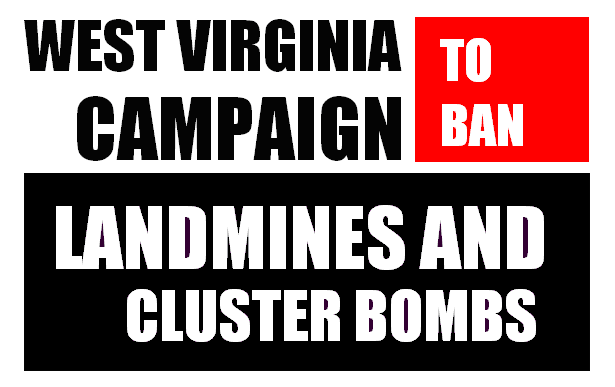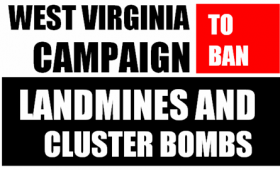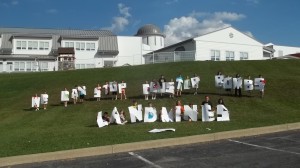DECEMBER 2013
How Soon is “Soon?”
4 Years Later and World Still Waiting for Conclusion of
Obama Administration’s Landmine Policy Review
In response to pressure from civil society, the Obama administration began a review of U.S. landmine policy in December 2009. Four years later, we are still waiting for the outcome of that review. Today the U.S. Campaign to Ban Landmines (USCBL) including members of WVCBL/PSALM wrote the President again to express frustration that no announcement has yet been made.
Last year at the Mine Ban Treaty’s annual meeting in Geneva, the United States observer delegation stated that the U.S. would be announcing the outcome of its then three-year review of its landmine policy—and whether or not it will join the treaty—“soon.”
In response, the USCBL held a briefing the next day to discuss the statement and the status of the review. Speaking as a member of the panel, the head of the U.S. delegation and representative of the Office of Weapons Removal and Abatement indicated that a reasonable interpretation of “soon” meant—at the outside—that an announcement of the decision of the review would take place no later than the next Meeting of States Parties. That Meeting will begin December 2, 2013.
The letter to the President states, “The U.S. Campaign to Ban Landmines is an affiliate of the Nobel Peace Laureate International Campaign to Ban Landmines, and as such we are comprised of thousands of individuals and NGOs which represent the myriad American citizens, landmine survivors, international allies, and campaigners from every corner of the globe.” It continues, “We call on your administration not to delay further an announcement of the new U.S. landmine policy—a policy which should be aimed at a comprehensive ban on the use, production, transfer, and stockpiling of antipersonnel mines and ultimately at accession to the Mine Ban Treaty.” Campaigners have remained clear that they expect the administration to live up to its commitment and to announce the outcome of the review and the new U.S. landmine policy by the end of the conference on Thursday, December 5.
“It is unacceptable to continue to defer the outcome of this review,” said Zach Hudson, USCBL coordinator. “Landmines still have a devastating humanitarian impact in 2013. During the timeframe of this U.S. review alone, more than 16,000 new men, women, and children have been killed or maimed by a landmine, and ten more casualties will continue to occur every day. Many of these deaths and injuries will be a result of U.S. landmines from conflicts past. How can the administration continue to treat this as if it is not a priority?”
The United States reportedly retains some 10 million stockpiled antipersonnel mines for potential future use. With Poland’s ratification of the treaty last year, the U.S. is now also one of only 36 countries in the world that have not joined the Mine Ban Treaty—and is the only member of NATO that is not a State Party, and the only country in the Western Hemisphere, aside from Cuba, that has not joined.
Over the past four years, Obama and his administration have received letters of support for U.S. accession to the Mine Ban Treaty from 68 Senators, nearly 100 leaders of prominent U.S. nongovernmental organizations, key NATO allies, U.S. military personnel, 16 Nobel Peace Prize recipients, landmines survivors and countless citizens from around the world.
The Thirteenth Meeting of States Parties to the Mine Ban Treaty (13 MSP) will take place in Geneva, Switzerland from December 2nd- 6th, 2013. The meetings are held in the European headquarters of the United Nations, in the Palace of Nations. 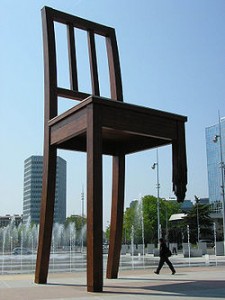 At this meeting, States Parties to the Mine Ban Treaty will give progress updates on implementing their treaty obligations and will make key decisions on a number of items. Countries that have not yet joined the Treaty will also be present to give updates on steps they are taking towards joining. Governments and international organizations gather each year in a mine-affected country or in Geneva, to assess progress and address challenges in universalizing and implementing the Mine Ban Treaty. The International Campaign to Ban Landmines delegation is comprised of experts, grassroots campaigners like ourselves and landmine survivors from all over the world. With an official observer status, the ICBL delivers statements in the plenary room, meets with international delegates and organizes side events. As coordinator of WVCBL/PSALM, I look forward to representing our members at the 13th MSP. An important facet of our mission of educating others is to document the key issues. This allows PSALM students and our community/country to not only see the effects of landmines and cluster munitions, but more importantly it shows they have a voice and their actions can have a positive impact on others… an invaluable lesson in hope and perseverance.
At this meeting, States Parties to the Mine Ban Treaty will give progress updates on implementing their treaty obligations and will make key decisions on a number of items. Countries that have not yet joined the Treaty will also be present to give updates on steps they are taking towards joining. Governments and international organizations gather each year in a mine-affected country or in Geneva, to assess progress and address challenges in universalizing and implementing the Mine Ban Treaty. The International Campaign to Ban Landmines delegation is comprised of experts, grassroots campaigners like ourselves and landmine survivors from all over the world. With an official observer status, the ICBL delivers statements in the plenary room, meets with international delegates and organizes side events. As coordinator of WVCBL/PSALM, I look forward to representing our members at the 13th MSP. An important facet of our mission of educating others is to document the key issues. This allows PSALM students and our community/country to not only see the effects of landmines and cluster munitions, but more importantly it shows they have a voice and their actions can have a positive impact on others… an invaluable lesson in hope and perseverance.
PSALM: Proud Students Against Landmines and Cluster Bombs celebrated the International Day of Peace with art, music and community awareness presentations. The West Virginia Campaign to Ban Landmines and Cluster Bombs and PSALM students will host an art exhibition to be held at the Monongalia Arts Center in Morgantown, West Virginia titled, “A World of Difference”. The exhibit will feature art and photographs that emphasize the amazing diversity of the campaigns from all corners of the globe and the incredible scope of the work to ban landmines and cluster bombs. . Students made presentations at the West Virginia University Health Science Center on October 22 for Global Health Day. WVCBL member, Dr. Larry Schwab lectured on his experiences treating landmine injuries and his work with the campaigns to ban landmines and cluster bombs.
Nora Sheets
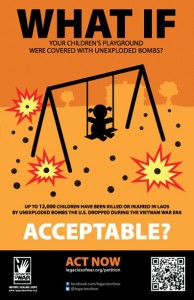 Zambian Presidency Calls for Africa-Wide and Universal Cluster Munition Ban at Global Treaty Meeting
Zambian Presidency Calls for Africa-Wide and Universal Cluster Munition Ban at Global Treaty Meeting
More than half the world’s nations met in Zambia in September to express their support for the international ban on cluster munitions. In addressing the Fourth Meeting of States Parties (4MSP) to the 2008 Convention on Cluster Munitions (CCM) this week, Zambian President Michael Chilufya Sata called on all countries to “condemn in the strongest terms all continued production, use and stockpiling of cluster munitions by any country.”
Zambia, which took on the Convention presidency at the meeting, expressed strong commitment to bringing all countries on board the Treaty. This is the first Meeting of States Parties to the Convention to be held in Africa.
“The success of this convention to date in reducing human suffering caused by cluster munitions was clearly demonstrated at the meeting this week. This success is built on the acknowledgement by a majority of countries that these indiscriminate weapons have no place in today’s world. We welcome the commitment of the Zambian presidency to a global ban on cluster munitions,” said Cluster Munition Coalition Director Sarah Blakemore.
The 4MSP President, Zambia Foreign Affairs Minister Wylbur Simuusa, called for Africa-wide adherence to the ban on cluster munitions. During the meeting this week, Namibia and the Republic of Congo announced they would ratify the Convention in the coming year, and South Africa said plans for ratification are well advanced. Gabon and South Sudan said they expected to accede to the treaty in the near future. Nigeria confirmed they are taking steps to ratify the Convention as did Kenya said it was looking at ratification.
African countries have been outspoken in their support for the global ban since its 2008 negotiation in Dublin, Ireland. Uganda hosted the first Africa-wide meeting on cluster munitions in 2008 and Zambia hosted a meeting of the Oslo Process to Ban Cluster Munitions in Livingstone in the same year. Ghana and Togo hosted regional meetings on the Convention on Cluster Munitions in 2012 and 2013 respectively. Forty-two of fifty-four African countries have joined the Convention, though nineteen of those have yet to ratify the treaty.
During the week-long meeting, participants adopted the Zambia Progress Report noting the large number of states that have condemned or otherwise expressed concern about the use of cluster munitions in Syria in 2012 and 2013. Thirty-one States Parties and signatories made statements expressing concern about the use of cluster munitions in Syria, with many more states condemning the use of cluster munitions by any actor under any circumstances.
States Parties have collectively destroyed 71% of their stockpiled cluster munitions since the Convention became international law just over three years ago. Chile announced completion of stockpile destruction at the meeting, while the UK and Denmark said they would complete their obligations by the end of 2013. Japan is beginning destruction of its stockpiles this month.
Several other States Parties with stockpiles are on track to complete destruction well in advance of the deadlines required by the Treaty.
Significant progress has also been made in the area of effective clearance of land contaminated with cluster munitions. States Parties cleared nearly 78km² across 11 states and two other areas in 2012 according to the Cluster Munition Monitor 2013 report. Mauritania announced at the meeting that it had finished clearing all known cluster munition contaminated areas.
Cluster munitions survivors from countries including Afghanistan, Ethiopia, Iraq, Lao PDR, Tajikistan, and Vietnam participated in the Zambia meeting and met with country delegates throughout the week. Assistance to survivors, and to their families and communities, is a key component of the Convention in addressing the unacceptable harm caused by cluster munitions.
“The inclusion of survivors is an essential characteristic of the cluster munition ban community and something all states should be particularly proud of,” said Cluster Munition Coalition Spokesperson, Branislav Kaptanovic.
85 Countries have yet to join the Convention on Cluster Munitions
http://www.stopclustermunitions.org/jointhetreaty/
About cluster bombs:
A cluster munition (or cluster bomb) is a weapon containing multiple, often hundreds, of small explosive submunitions or bomblets. Cluster munitions are dropped from the air or fired from the ground and are designed to break open in midair, releasing the submunitions over an area that can be the size of several football fields. This means they cannot discriminate between civilians and soldiers. Many of the submunitions fail to explode on impact and remain a threat to lives and livelihoods for decades after a conflict.
About the Cluster Munition Coalition (CMC):
The Cluster Munition Coalition (CMC) is an international coalition of nongovernmental organizations (NGOs) working in around 100 countries to eradicate cluster munitions, prevent further causalities from these weapons, and put an end for all time to the suffering they cause. The CMC works to change the policy and practice of governments and organisations towards these aims and raise awareness of the problem amongst the public.
For more information or to schedule interviews with Cluster Munition Coalition members contact:
Jared Bloch, Media & Communications Manager, International +41 786 83 4407, Email: [email protected]
Media Resources
· CMC Homepage – http://www.stopclustermunitions.org/
· CMC YouTube Channel – http://www.youtube.com/my_videos?o=U
